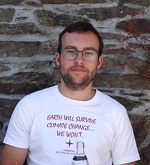Elsevier Award phiRO 2023
Awardee Interview

Bram Carlier
PhD student in the biomedical sciences
KU Leuven
Leuven
Belgium
What have been the highlights of your career?
Being in the final year of my PhD, I’m still very early in my career so it feels a bit strange to talk about highlights, especially as I try to live life as a constant preparation for the next “big thing”. Therefore, I think my highlight is more the continuous evolution I go through.
What is your next challenge?
Finishing my PhD thesis is definitely my first big objective. But at the same time, I don’t want to define myself solely by my professional career so typically I also set goals in different areas of my life. Running a marathon has been on my ‘bucket list’ for a while but, as I’m injured at the moment, I might need to rethink that one for now.
What do you think are the next challenges for radiation oncology professionals?
One thing that struck me during the ESTRO conference was the number of presentations that talked about combinatorial treatments combining chemo- or immunotherapy with radiotherapy despite a lack of ‘pharma’ companies represented in the exhibition area. So while the community is already doing a great job in terms of multidisciplinary collaborations, I think the big challenge will be to reach beyond the current community to create even more synergy between treatments, whether available or under development, in the hope of saving even more patients.
What does this award mean to you?
I think it primarily indicates the excitement of the radiation community toward novel solutions for longstanding problems. As a fundamental researcher who does not have daily contact with clinicians or patients, it is a nice confirmation that what we do also matters.
To whom would you like to dedicate your award?
My sister Chiara. Because of attending the ESTRO conference, I missed her birthday. So hopefully this makes up for it a bit.
What has been your involvement within ESTRO?
Sadly, I haven’t really been involved in the ESTRO community. As a matter of fact, this year was my first time attending the ESTRO conference and it truly was an amazing experience.
What started your interest in science?
I grew up in a family taunted by several chronic diseases including asthma and fibromyalgia. I remember as a kid that, when someone told me to make a wish, I would wish my mum would have no pain anymore. Hence, witnessing the devastating effects of chronic diseases firsthand, I guess I was predisposed toward a career in medical technology.
Did your parents encourage you in your career, or would they rather you had done something else?
My parents were always very supportive, even if they often worried that I was overplaying my hand. For example, when I decided to study Latin in middle school, my parents would say that it would be totally fine if I would choose something ‘easier’. But when they realised that’s what I wanted to do, they would immediately buy me a Latin Harry Potter book, or would interrogate me on a daily basis to help me study my Latin vocabulary.
What are you proudest of in your career?
One thing I had to promise my mum is that, even if I aim for an ambitious career, I should never forget where I come from and become arrogant. While of course, I’m still very young now, I always take bigger pride in my kindness than in winning awards like this one (although the latter is also really nice !)
If you hadn’t been a scientist, what would you like to have been?
I’m truly passionate about passionate people. Therefore, I think I could enjoy any career where I’m surrounded by people who are continuously striving to become better, whether this be in sports, arts, the service industry, or whatever.
What do you do in your spare time?
I try to maintain an active lifestyle through running, swimming, and hiking and, for about a year now, I have been actively blogging about the PhD life on social media (Instagram: @thephdreamer). In this blog I try to share the good, the bad and the ugly to demystify my career path and show the human side surrounding it.
When do you think you will retire, and what would you like to do then?
I have absolutely no idea. I am 27 now, so if I had already been actively thinking about my retirement, I guess I would be in the wrong field.